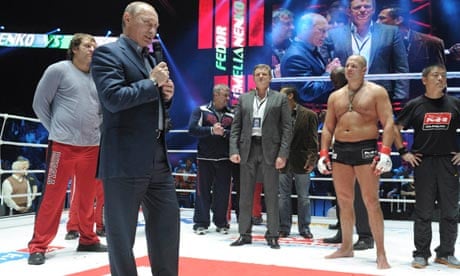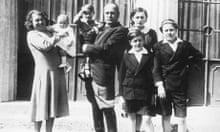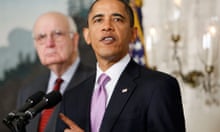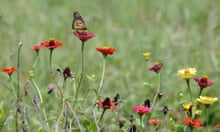It was the moment when the worm turned. In November Vladimir Putin attended a martial arts fight at Moscow's Olympisky stadium. When he took the microphone something extraordinary happened: there were noisy jeers and catcalls from the audience. (Kremlin spin-doctors tried to explain it away by claiming fans needed to go to the bathroom.)
Worse was to follow. On 4 December Putin's United Russia party suffered a humiliating reversal when its share of the vote in Duma elections fell from 64% to below 50%. Even this disappointing result was achieved only by industrial-scale fraud – carousel voting, ballot box stuffing, the erasing of votes for the "wrong" parties.
Violations in Russian elections are nothing new. But after 12 years of Putin it seems the Russian populace – especially its middle class – has had enough of the cheating, lying and feudal disdain that have characterised his rule. Over the last month tens of thousands have taken to the streets of Moscow, in the biggest anti-government protests since the fall of the Soviet Union.
How did we get here? And where is Russia going? In his lively and absorbing study of the Putin years Angus Roxburgh talks to many of the protagonists who have had to deal with the chippy former KGB spy. They include Mikhail Saakashvili (whose small country, Georgia, Putin invaded), Jonathan Powell (who reveals Tony Blair's trick for dealing with Russia: treat it like a superpower, even though it isn't one) and US hawks such as Condoleezza Rice.
There are some lovely details. Rice recalls how Russia's foreign minister Sergei Lavrov told her that the Kremlin would only withdraw its tanks from Georgia if Saakashvili resigned – an outrageous request. Putin, meanwhile, liked to use KGB tricks in international pow-wows. (Knowing that Angela Merkel dislikes dogs, he allowed his to sniff around the German chancellor's legs.)
Roxburgh is a former Moscow correspondent for the Sunday Times and the BBC, but he is especially well placed to tell the story of how the west's early enthusiasm for Putin turned sour: in 2006 he went to work for the Kremlin as a PR advisor. His boss was Dmitry Peskov, Putin's smooth, English-speaking press spokesman, and the main interface between Russia's secretive, largely ex-KGB leadership and the Anglo-Saxon world. Roxburgh's mission was to help the Kremlin improve its disastrous image abroad. This was never going to be easy. The assignment grew even more hopeless after the murder of the crusading journalist Anna Politkovskaya, the polonium assassination of Alexander Litvinenko in London, and the Russian-Georgia war.
Senior Russian officials, Roxburgh writes, are almost entirely clueless about how the western media works. They are genuinely convinced that it's possible to buy positive coverage in the Wall Street Journal, or other international publications. During his time as an adviser, the Kremlin paid the New York PR agency Ketchum a whopping $1m a month.
In a series of memos he explained that negative events in Russia were responsible for generating bad headlines abroad. No amount of PR, he pointed out, would compensate for a photo showing riot police beating people up – standard procedure until the numbers turning up to demonstrate against Putin swelled last month from 500 to 50,000. But no one was listening. I attended several dinners in Moscow arranged by Roxburgh with Peskov. (At one I met Vladimir Churov, the bearded conjuror and election commission head responsible for much of the recent egregious vote-rigging.) We asked Peskov about Putin's knowledge of polonium. The dinners stopped.
Roxburgh argues that the west and Russia are equally to blame for the misunderstandings and wasted opportunities of the last decade. The "new cold war", he says, isn't just the result of Putin's strident behaviour and his "legitimate" pursuit of Russian interests. It's also down to "American insensitivity". Roxburgh was with the president's entourage in Munich in 2007 when Putin made his most blistering attack on US power. We can expect more of this when he returns to the Kremlin in 2012 for his third presidential stint – despite the latest unprecedented protests this is still almost certain to happen.
But it's hard to see how the west could ever have accommodated all of Putin's post-imperial complexes. His list of geopolitical grudges is long: Nato expansion, the US's Europe-based missile defence programme, the lack of reciprocity following Putin's support for George Bush's war on terrorism. According to Dmitry Medvedev, now elbowed aside, Russia has "privileged interests" in its backyard: in other words, the right to meddle and interfere in neighbouring sovereign states.
Putin's self-conceived historical mission is an explicitly nationalist one: to restore Russian greatness. In reality, however, he presides over a country of corruption, a degraded military, dying villages and spectacular inequality. The social contract of the Putin years – give up your rights in exchange for increased prosperity – has collapsed, as Russians tire of their kleptocrat rulers and TV for zombies.
As a Moscow correspondent, I was struck by how Putin and his team live in a world of KGB fantasy. In this a priori realm, all western diplomats and journalists are spies, and every move by the west part of a conspiracy or plot to weaken Russia. As Roxburgh observes of Putin: "He is exceedingly well-informed, but also surprisingly ignorant about aspects of western life." In recent weeks he has retreated further from reality. In a lengthy question-and-answer session, screened live on state television, Putin said that the thousands who demonstrated against him were paid stooges of the west – a slur that is only likely to increase opposition. He also said the white ribbon worn by his opponents resembled a condom. The title of Roxburgh's book is apt. Putin (left)has cultivated a strongman image like no other modern politician. But suddenly he looks weak.





Comments (…)
Sign in or create your Guardian account to join the discussion